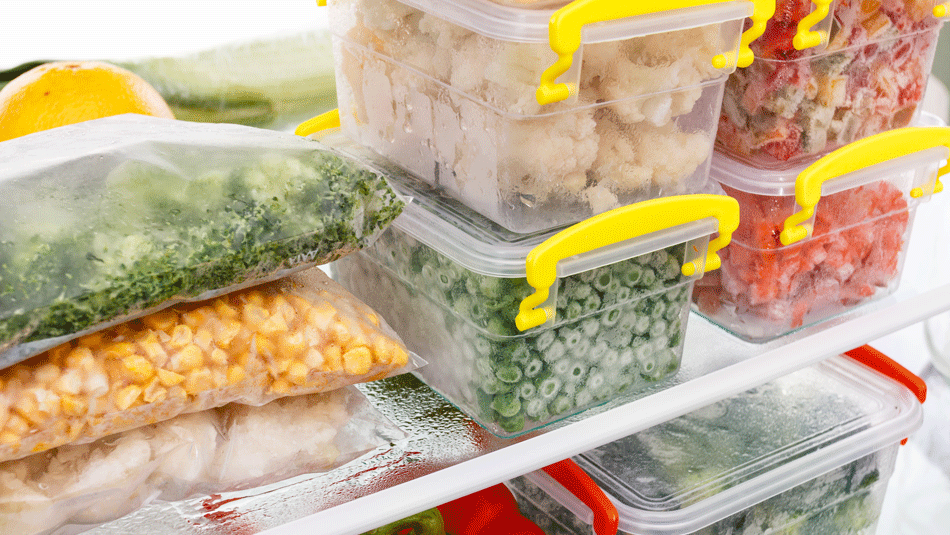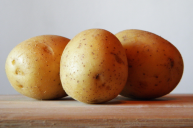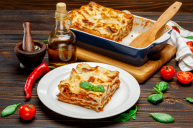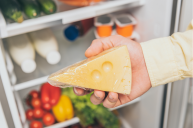Freezing food is an excellent way to preserve it and to cut down on food waste. In my house, the freezer is packed. I almost always have leftover batches of soups that I can easily and safely defrost for a quick dinner. Also, since it's just my husband and I in our house right now, we don't really go through a lot of food on a weekly basis. I like to pick up a bunch of different meats that are on sale at the store that I end up keeping in the freezer. It's easy to safely defrost meat and I've noticed it creates less waste and saves us some money.
Videos by Wide Open Country
However, it's important to know the dos and don'ts of foods that are acceptable to freeze. You might think that freezing these foods will save them, but in the end you might just be tossing them in the garbage after defrosting. The freezer can cause certain foods to look unrecognizable and taste different after defrosting, so it's helpful to have a list to remember. Here's 10 foods that it would be best to not freeze.
1. Salad Greens
If you plan on eating salad greens raw, keep those gorgeous salad greens like mesclun, micro greens and spinach out of the freezer. They taste so much better fresh and crisp, so make sure to purchase them when you know you're going to serve them within a few days.
Since greens have such a high water content, freezing them will cause large ice crystals to form on the greens making them soggy and slimy after defrosting, especially with delicate salad greens. Store clean lettuce wrapped in a paper towel in a container or plastic bag to extend the life of your lettuce.
However, if you do have some heartier leafy greens that you know you're going to end up cooking down for a certain dish or you're just going to throw in your morning smoothie, freezing these greens is actually not a bad idea. Thicker greens like butterhead lettuce might hold up a little better and the moisture can actually help out a sautéed dish or soup.
2. Milk and Yogurt
Yes, it's tempting to stock up on milk and other dairy products when there's a good deal going on at the store to hide away in the freezer, but it will dramatically change the taste and texture of the dairy. Milk, after thawing, can become lumpy and taste watery, which isn't ideal especially if you want to drink it straight.
However, you can freeze milk and thaw it if you know you're going to use it in a cooking process later on. Just be sure to give it enough time to thaw out in the refrigerator before cooking.
Other dairy products like yogurt and soft cheeses (ricotta, cream cheese, sour cream, etc.) are best to keep out of the freezer all around because it can cause separation, curdling, and give the food a grainy texture. Some foods also have live bacteria cultures, which can be destroyed during the freezing process. Keep these foods in the refrigerator for the best taste.
3. Raw Potatoes
Like salad greens, raw potatoes have a high water content and when you freeze them, large ice crystals will form. After defrosting, you'll be left with a mushy and grainy potato. It's best to keep raw potatoes stored in a cool, dry place and away from areas that can give off moisture.
If you really want to freeze potatoes that you don't want to waste, try cooking them first and storing in a freezer-safe container.
4. Whole Eggs
There's nothing better than waking up to a delicious breakfast full of eggs (and coffee!). You can find good deals on eggs at the grocery store, so it's easy to buy in bulk. It's important to know, though to not freeze eggs in their shell because the liquid eggs expand when they're frozen, which can cause an explosion of an eggy mess in your freezer. Yikes! I don't think that's what you would want to wake up to in the morning!
However, you can safely freeze eggs removed from their shell and placed in freezer-safe containers or baggies for up to one year. When you're ready to use frozen eggs, just give them time to defrost in the refrigerator making sure to throughly cook them in the dish you make.
5. Fried Food
https://www.instagram.com/p/BeCC8KRntl_/?tagged=friedfood
There's nothing like the crisp texture of French fries, fried chicken or any fried food for that matter! Sometimes it's easy to go a little overboard when ordering fried food take-out, but it's best to keep any leftovers out of the freezer. The crispy and delicious fried batter will turn soft and mushy in the freezer. All of the oil will seep into the food, turning it into a soggy mess!
You can also keep leftover fried food in the refrigerator and heat it up in the oven the next day to try and revive it, but it's best to eat fried food the same day.
6. Cheese
If you properly store hard cheese, it has a pretty long fridge life, so there's really no need to freeze it. Freezing hard cheeses will change its texture, turning it crumbly and mealy.
If you put soft cheeses in the freezer, the moisture will crystallize and you'll lose that fluffy texture. For the most part, quality cheeses last for a few months in the refrigerator, so there's no need to worry about freezing.
7. Certain Raw Vegetables and Fruits
Certain raw veggies and fruits that have a high water content will turn icy and end up with freezer burn, leaving them limp and mushy after thawing. It's best to keep them in the refrigerator so they stay fresh and crisp. Here are some better options if you really do not want to waste those beautiful vegetables and fruits.
Melon: The only way you can get away with freezing it is if you plan on throwing the frozen chunks into your smoothie recipe.
Tomatoes: Any extra tomatoes you might have can be turned into homemade sauce. Freeze the sauce for a last-minute homemade pasta sauce.
Cucumbers: Brine cucumber slices for homemade pickles. They're actually really easy to make!
Celery: Celery has a pretty long fridge life, but you can always cut them up and spread peanut butter on top for an afternoon snack.
8. Cooked Pasta
I love pasta, it has to be one of my favorite foods. Hand me a bowl of al dente pasta and I'll be a happy camper! Unfortunately, it's one of those foods that always seems to make a big batch. If that happens, do not freeze it. Freezing cooked pasta will actually change the texture and turn it soggy when you try to thaw it due to the water it was cooked in. No one wants to eat soft, mushy pasta!
For better results, you can always slightly undercook the pasta and then freeze it in containers, but in my opinion, fresh pasta is always best!
9. Mayonnaise
It might be tempting to freeze any leftover mayo in the jar, but doing so will change the consistency of this popular condiment. Mayonnaise separates when frozen, leaving you with an unappetizing, grainy liquid that, when thawed, no one would want spread on a sandwich. Mayonnaise has a pretty long shelf life, so there's no need to worry about that. You can always opt for the smaller jar of mayo, too.
10. Spices
Tossing ground spices in the freezer to preserve them will actually cause them to become more concentrated when you defrost them. You'll end up with spices that have a stronger flavor that can taste bitter when added to dishes.
If you really want to save your spices, consider purchasing a vacuum sealer to remove the excess air and extend the shelf life.




